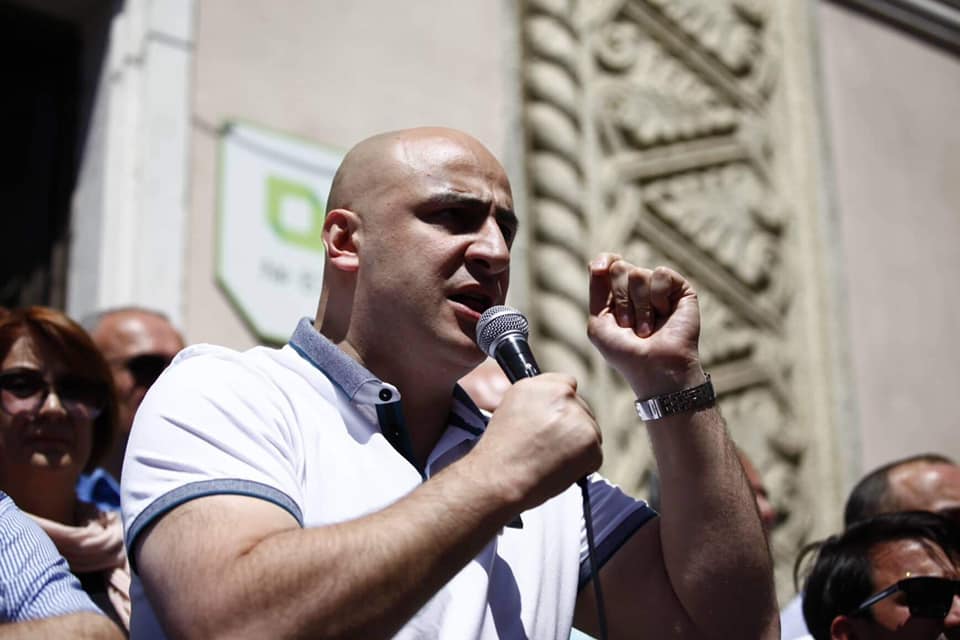Most political parties have signed the compromise proposal put forward by European Council President Charles Michel, though the precise measure for releasing United National Movement Chairperson Nika Melia from pretrial detention remains disputed. The possible options differ substantially, having sparked disagreements between the signatories.
According to the agreement itself, the two cases of “perceived politicized justice,” including that of Nika Melia and Giorgi Rurua, must be addressed in a week’s time “either by an amnesty and/or by taking such steps as to produce an equivalent outcome.”
These ambiguously defined “steps,” however, created a source of additional confusion and biased interpretations between the political parties. Nika Melia himself has repeatedly voiced against the adoption of the amnesty law, which would potentially give pardon to all persons facing charges from June 20-21 events including “violent officials and police officers.” He has also fiercely opposed the prospect of posting bail, even by the European Union, claiming the latter is “unlawful and unacceptable.”
The ruling Georgian Dream party, despite signing the April 19 deal, refuses to refrain from issuing critical comments against the detainee. GD Chairperson Irakli Kobakhidze said yesterday that the amnesty should involve all who are facing charges or could face charges from June 20-21 events. “If the amnesty applies to Nika Melia, it should naturally apply to someone else who may have committed a crime that night,” also given that the UNM Chair engaged in “the most serious crime,” MP Kobakhidze remarked.
U.S. Ambassador to Georgia Kelly Degnan, who was actively involved in mediating the political crisis, also commented on the amnesty issue stating that it “does not preclude accountability for those events, but it does allow the country to move forward.” “Of course it is Mr. Melia’s personal decision whether he leaves prison or not but the agreement offers an arrangement for Mr. Melia’s release,” Ambassador Degnan added.
Meanwhile, leaders of the Lelo party, Mamuka Khazaradze, Badri Japaridze, and Grigol Gegelia, who departed for a working visit to Brussels on April 21, sought an alternative measure to release the UNM Chair. The Lelo leaders said, when meeting with MEPs in Brussels, they suggested that the European lawmakers provide personal surety for Melia to change his preventive measure, which according to Lelo, the MEPs are ready to commit to.
While Melia’s view on Lelo’s proposal remains unknown, top UNM members show readiness to accept it as a compromise move. “This is a better proposal, as both the bail and the amnesty are “categorically unacceptable” for the UNM, said Khatia Dekanoidze, UNM leader. Other opposition parties also favored the new proposal, doubting, however, whether the ruling party is ready to accept it.
The PR Secretary of the ruling Georgian Dream party, MP Shalva Papuashvili, confirmed these doubts, calling the Lelo proposal “unserious,” as it “undermines the spirit of the agreement.”
The Public Defender of Georgia, Nino Lomjaria, floated another possible option to release Melia, noting that “there is a provision in the criminal law according to which the Prosecutor’s Office can terminate the prosecution of a person if it considers that the circumstances have changed substantially.”
She said a political agreement regarding Melia’s case is already in place, meaning that “the circumstances are ready to end the prosecution.” The Prosecutor’s Office has so far not responded to the Public Defender’s proposition.
Also Read:
- Saakashvili Says UNM Shall Sign Agreement after Melia Leaves Prison
- President Michel Meets Georgian Dream, Opposition in Parliament
- President Michel Visits Tbilisi, Meets Georgian Leaders
- Georgian Dream, Opposition, Except for UNM, EG, Sign EU Proposal
This post is also available in: ქართული (Georgian) Русский (Russian)

